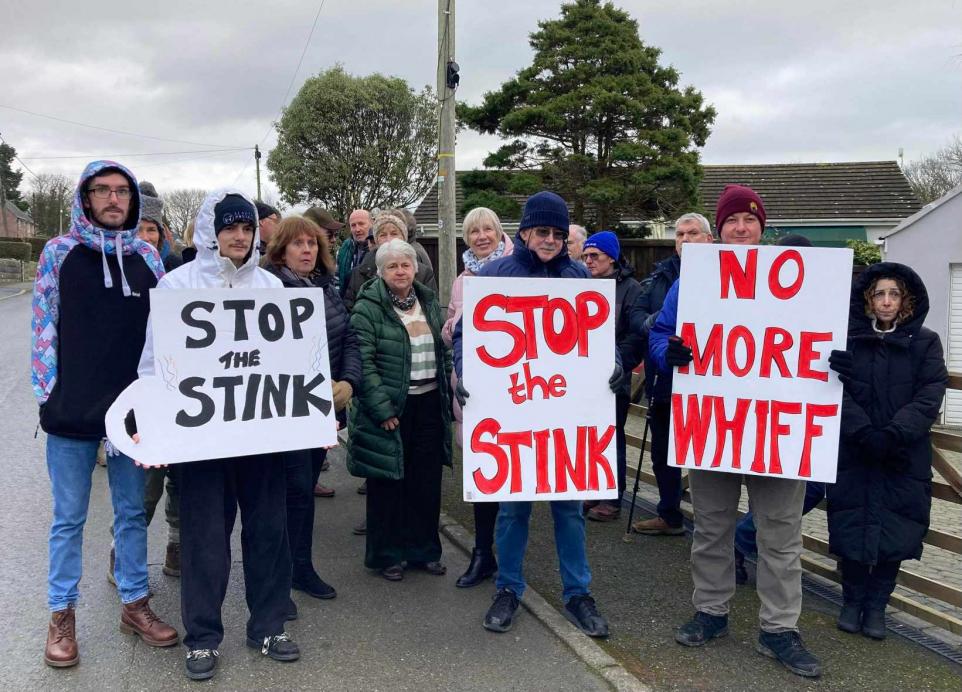News
Secret session discusses unlawful Bryn payments
 IF you were one of the people trying to find out how controversial Council fat cat Bryn Parry Jones had responded to a Council request to pay back the unlawful payments he received, tough luck! Despite the fact the contents of the letter responding to the Council’s request were already in the public domain, the discussion of how public money had been spent on a public servant was held in private. Conservative group leader David Howlett told the Herald: “With David Bryan, I voted for a public debate which was lost and so we went into private session. We supported a Plaid amendment that it would be foolish to pursue court action due to costs but expressed regret that the money was not being returned. “Some IPPG members supported this and had Labour members also supported it, we would have won. Because Labour did not support the Plaid amendment, we had another vote to take no further action, from which I abstained. “Labour’s stance meant the end result was no further action would be taken. I have to ask whether (Labour leader) Paul Miller sees this as a result, because that is what he and his group made sure happened.” Labour leader Paul Miller told us: “On principle, the Labour group decided not to accept anything less than the Chief Executive being forced to pay back the money unlawfully paid to him. “The vote today is not the end of the matter. “I still firmly believe that the Council must take action to get the money back.” Accepting a request from Bryn Parry Jones’ union Councillors chose to discuss Bryn’s letter, which told his employer to get lost, behind closed doors and with the cameras turned off. That union’s request was backed by the Council’s Head of Legal Services, who said: “Members have strong feelings about this issue, it is the case, in my opinion, that all employees of the Council do have a legitimate and reasonable expectation, both in employment terms and in accordance with their human rights, that their relationship with their employer should be conducted in appropriate confidence. “ The letter’s content was reported online and reveals: • Bryn gave the unlawful payments he received to his wife for her to invest; • Bryn claims his employer acted unlawfully by ceasing to make unlawful payments to him; • Bryn alleges that he has suffered a detriment by not receiving the unlawful payments. In addition to the above, Mr Parry Jones relies upon advice given to the Council that it was doubtful whether he could be compelled to disgorge the unlawful payments back to his employer. That element of his response is likely to cause particular controversy, as the Council’s CEO did not contribute to the cost of the legal advice he now relies upon to buttress his refusal to repay the money he received from the Council. Mr Parry Jones, whose Porsche sports saloon is paid for and insured by Council Tax payers, claims that he was entitled to rely upon the unlawful payments continuing to help plan his retirement and alleges a breach of contract by the Council in failing to make contributions to his pension. However, if the Council had continued to make unlawful payments to its CEO then it would itself have been acting unlawfully. Mr Parry Jones’ suggestion that he should have continued to receive the unlawful payments not only flies in the face of reason, but also suggests that he would have preferred the Authority to spend more Council Tax payers’ money defending his RIGHT to receive unlawful payments in the High Court. Again, at NO cost to himself. In addition, the whole scheme was hatched in order to help the CEO avoid tax on his massive publicly funded pension. The Council did not force Mr Parry Jones to accept the unlawful payments. Instead, he voluntarily entered the scheme in order to avoid future tax payments on his seven-figure pension pot. That scheme was hatched after Westminster government changed the Local Government Pension Scheme rules when it became clear that the system of tax relief was being abused by a minority of senior officers across the UK. The Pembrokeshire Herald asked the County Council to comment both on the letter’s content and the fact that it had been leaked. A Council spokesperson told us: “The letter to which you refer is marked private and confidential. It is not appropriate for us to comment on its contents.”
IF you were one of the people trying to find out how controversial Council fat cat Bryn Parry Jones had responded to a Council request to pay back the unlawful payments he received, tough luck! Despite the fact the contents of the letter responding to the Council’s request were already in the public domain, the discussion of how public money had been spent on a public servant was held in private. Conservative group leader David Howlett told the Herald: “With David Bryan, I voted for a public debate which was lost and so we went into private session. We supported a Plaid amendment that it would be foolish to pursue court action due to costs but expressed regret that the money was not being returned. “Some IPPG members supported this and had Labour members also supported it, we would have won. Because Labour did not support the Plaid amendment, we had another vote to take no further action, from which I abstained. “Labour’s stance meant the end result was no further action would be taken. I have to ask whether (Labour leader) Paul Miller sees this as a result, because that is what he and his group made sure happened.” Labour leader Paul Miller told us: “On principle, the Labour group decided not to accept anything less than the Chief Executive being forced to pay back the money unlawfully paid to him. “The vote today is not the end of the matter. “I still firmly believe that the Council must take action to get the money back.” Accepting a request from Bryn Parry Jones’ union Councillors chose to discuss Bryn’s letter, which told his employer to get lost, behind closed doors and with the cameras turned off. That union’s request was backed by the Council’s Head of Legal Services, who said: “Members have strong feelings about this issue, it is the case, in my opinion, that all employees of the Council do have a legitimate and reasonable expectation, both in employment terms and in accordance with their human rights, that their relationship with their employer should be conducted in appropriate confidence. “ The letter’s content was reported online and reveals: • Bryn gave the unlawful payments he received to his wife for her to invest; • Bryn claims his employer acted unlawfully by ceasing to make unlawful payments to him; • Bryn alleges that he has suffered a detriment by not receiving the unlawful payments. In addition to the above, Mr Parry Jones relies upon advice given to the Council that it was doubtful whether he could be compelled to disgorge the unlawful payments back to his employer. That element of his response is likely to cause particular controversy, as the Council’s CEO did not contribute to the cost of the legal advice he now relies upon to buttress his refusal to repay the money he received from the Council. Mr Parry Jones, whose Porsche sports saloon is paid for and insured by Council Tax payers, claims that he was entitled to rely upon the unlawful payments continuing to help plan his retirement and alleges a breach of contract by the Council in failing to make contributions to his pension. However, if the Council had continued to make unlawful payments to its CEO then it would itself have been acting unlawfully. Mr Parry Jones’ suggestion that he should have continued to receive the unlawful payments not only flies in the face of reason, but also suggests that he would have preferred the Authority to spend more Council Tax payers’ money defending his RIGHT to receive unlawful payments in the High Court. Again, at NO cost to himself. In addition, the whole scheme was hatched in order to help the CEO avoid tax on his massive publicly funded pension. The Council did not force Mr Parry Jones to accept the unlawful payments. Instead, he voluntarily entered the scheme in order to avoid future tax payments on his seven-figure pension pot. That scheme was hatched after Westminster government changed the Local Government Pension Scheme rules when it became clear that the system of tax relief was being abused by a minority of senior officers across the UK. The Pembrokeshire Herald asked the County Council to comment both on the letter’s content and the fact that it had been leaked. A Council spokesperson told us: “The letter to which you refer is marked private and confidential. It is not appropriate for us to comment on its contents.”
Business
Workplace volunteering could boost productivity and unlock billions

EXPANDING workplace volunteering opportunities to cover all employees in the UK could generate billions in economic gains (£1.2 billion – £3.6 billion per year in wellbeing benefits to individuals, £1.6 billion – £2.8 billion per year in improved net productivity)
Ensuring all employees have access to volunteering opportunities could save between 1.4 million and 2.5 million working days of sickness absence.
Workplace volunteering has the potential to boost productivity, improve employees’ wellbeing, and generate billions for the UK economy, according to a new report by Pro Bono Economics (PBE).1
The report – ‘Triple dividend: How workplace volunteering can make us happier, healthier and more productive’ – which has been produced for business volunteering charity Pilotlight, found that net productivity gains of between £1.6 billion – £2.8 billion could be unlocked for the UK economy by expanding workplace volunteering opportunities.2
PBE’s analysis revealed that 17 – 23 million employees currently do not have access to workplace volunteering, and so are missing out on the health benefits of volunteering and the opportunities to learn new skills. By expanding workplace volunteering opportunities to cover all employees in the UK, the current untapped potential could generate £1.2 billion – £3.6 billion in wellbeing benefits per year to the individuals themselves.
It could also reduce levels of absenteeism, with research showing that participation in a workplace volunteering scheme provides an average reduction in absence of around 0.9 days per year for each member of staff volunteering.3 The number of days that employees have taken off work due to illness has risen sharply since the pandemic, with 186 million lost alone in 2022, an increase of more than a third over the 2019 level. The total cost of sickness absence to UK employers was around £24 billion – roughly equivalent to the GDP generated by Newcastle – or £6.4 billion higher than if absence rates stayed at the 2019 level.4
Turning to the productivity benefit overall, the PBE report points to studies which have suggested the productivity impact of workplace volunteering is sizeable, with high-skilled individuals who volunteer experiencing an estimated £2,300 boost to earnings. If the estimated productivity increase was applied to all the 1.4 – 2.5 million additional volunteers who participated from workplace volunteering to all employees, it could provide a gross productivity increase of between £2.2 billion and £3.9 billion.
Even after deducting the costs of lost time and administration fees for volunteering schemes, the productivity benefits could amount to net productivity gains of between £1.5 billion and £2.8 billion to the UK economy.5
There is a clear appetite from employees from the expansion of workplace volunteering. Analysis by NCVO suggests that between one quarter and a third of employees will take advantage of workplace volunteering when it’s available. This means that between 1.5 million and 2.8 million additional people might volunteer if workplace volunteering schemes were expanded across all employers.
While boost workplace volunteering would have some costs to the employer, the benefits more than outweigh those costs. For the employer, workplace volunteering schemes such as those run by Pilotlight which bring businesses and charities together could deliver between £1.50 and £3.60 of benefits for every £1 spent.
To make the most of the opportunity, research by the charity has suggested that employers should take steps to help employees around the options for volunteering. More than a third of employees surveyed (38%) said that an obstacle to volunteering is a lack of guidance from their employer. Of those currently involved in workplace volunteering, 79% believe that businesses themselves benefit from the practice.6
The benefits also have the potential to positively impact on communities, at a time when they are in need of extra support. Three in ten (30%) charities reporting increased rates of staff burnout as they struggle with the triple challenge of rising demand, difficulties recruiting volunteers and challenges with recruitment. This is particularly true of small charities, with almost six in ten (59%) reporting that recruiting volunteers is a major concern for them following a long-term decline in volunteer participation rates.8
Dr Jansev Jemal, Director of Research and Policy at Pro Bono Economics, said: “Increasing access to workplace volunteering opportunities has a triple dividend, as it could boost productivity and unlock billions in the UK economy, while providing much needed support for charities. In addition to wellbeing for employees, there’s a compelling, hard-nosed business case for considering workplace volunteering, including boosts to health and skills.
“As businesses take up this opportunity, there is a need to be realistic about the challenges for the charities themselves. Using volunteers effectively takes resources to manage, oversee and support those that are giving up their time. Businesses and other funders will need to consider how they can benefit by supporting the underlying costs of volunteering programmes, rather than assuming that an offer of time alone will suffice.”
Ed Mayo, Chief Executive of Pilotlight, said: “When it comes to business and charity, these results change everything – volunteering is not a cost, it is an investment. It is good for charity, good for the volunteer and good for the bottom line.
At the heart of this, in the partnerships we have designed with a range of leading businesses, is how employees develop their skills as they deploy them in a radically different setting. In future, it will not be the PR or corporate affairs department that leads on employee volunteering, but HR leaders who see it as an integral part of their toolkit for developing talent and skills.”
Jack Kidder, Responsible Business Manager at Henry Boot PLC, said: “At Henry Boot, we know that volunteering empowers our people to dedicate their time, skills, and passion for the benefit of our communities. This is not only impactful for charities, but also hugely beneficial for our business. Volunteering their time allows our people to connect with issues they care about in the communities in which we work and live. It creates a genuine sense of purpose and cohesion as our people come together to make a real difference for others – whether through inspiring learners, supporting communities, restoring habitats, or sharing knowledge. Volunteering enables our people to develop their skills and experience the positive wellbeing effects associated with helping others. This use of our time is helping shape our evolving culture as we celebrate being a long-term sustainable business that genuinely cares for the communities we work with, while we create exciting new places across the UK.”
Alexandra Berry, Head of Sustainability at the Strand Palace Hotel said: “Our team love to get involved in team-building hikes, red nose days, wellbeing walks, ‘Wear it Pink’ days, charity runs, bingo nights, themed quizzes, clothing donation drives, as well as offering our team a paid volunteering day each year. Feedback from our team has expressed these community events provide socialisation and relaxation outside of the hotel alongside contribution to a charitable cause, of which they are passionate about supporting.
“In 2023, the team raised over £3,000 through 8 local fundraising activities. What’s more, we have a regular commitment with The Connection at St Martins for our team members to volunteer to spend time with The Connection’s guests in their art room. With arts, crafts and chatting, the visits from the Strand Palace team help to build the guests’ confidence and social skills, providing a creative outlet away from the stress of being homeless.”
Health
Pembrokeshire residents suffer severe health decline ‘due to landfill gases’

A PEMBROKESHIRE couple, Mr Richard and Revd Patricia Rogers of Crud yr Awel, are experiencing severe health issues attributed to emissions from the Withyhedge Landfill, resulting in drastic lifestyle changes and severe symptoms.
Revd Rogers, who has managed asthma since childhood, reported a significant deterioration in her condition following exposure to landfill gases. Despite having controlled her asthma with minimal medication for years, she now requires intensive treatment including increased doses of Symbicort and Salbutamol Sulfate inhalers, alongside courses of steroids and antibiotics. Her symptoms have escalated to include extreme breathlessness, a hacking cough, frequent nosebleeds, continual headaches, and vertigo, culminating in a severe impact on her ability to perform daily tasks and care for her disabled daughter.
The couple’s health is closely monitored through their doctor’s surgery, and they attend the asthma clinic regularly. However, feeling powerless to directly change the situation, they have taken a stand by cancelling their council tax payments, a decision they plan to maintain until the landfill issue is resolved.
Revd Rogers has also prepared a letter to the Coroner, outlining the severity of her health issues as potentially life-threatening due to the landfill’s impact. This dramatic step underlines the gravity of their situation and their desperation for a resolution.
The Rogers’ story is not just a personal tragedy but a stark example of the broader environmental and health challenges faced by the community surrounding the Withyhedge Landfill.
They are calling for punitive measures against those responsible, including compensation for the financial impacts of their ordeal.
Their story has surfaced on the same day we reported that Natural Resources Wales is taking further enforcement action against the firm running the site.
NRW has issued site operators Resources Management UK Ltd (RML) with a further Regulation 36 Enforcement Notice which requires the operator to deliver a series of actions by specified deadlines to address ongoing smells from the landfill.
You can read more about the Enforcement Notice on the NRW website.
Outgoing Council Leader, Cllr David Simpson, said in a statement this week: “The smell from Withyhedge is having a major impact on residents and visitors. This situation has gone on too long and it is unacceptable.
“We now need to see RML act on the demands of the Notice and within the deadlines.
“The Council fully backs NRW’s stance that nothing is off the table in terms of further enforcement, including suspending the site’s environmental permit if appropriate, and we remain committed to working with NRW to ensure a long term solution to these issues.”
Entertainment
Fishguard Festival of Music launches at the Senedd in Cardiff

- Paul Davies MS for Preseli Pembrokeshire hosts event to promote major programme of summer concerts.
THIS year’s Fishguard Festival of Music/Gwyl Gerdd Abergwaun was officially launched at the Senedd in Cardiff Bay this week (Wednesday) in an event hosted by Paul Davies MS Preseli Pembrokeshire. Guests attending heard from the festival’s artistic director Gillian Green MBE about the 18 events extending over three weeks that will be staged at venues across Pembrokeshire from 18 to 31 July, including a concert by the Welsh National Opera Orchestra at St David’s Cathedral.
Paul Davies MS, said: “I’m truly honoured once again to sponsor the launch of the Fishguard Festival of Music. Over the summer, Fishguard will host world-famous musicians like harpist Catrin Finch and fiddle player Aoife Ní Bhriain, and the festival also includes performances from the National Youth Orchestra of Wales, the National Youth Choir of Wales and the Welsh National Opera Orchestra – so there really is something for everyone! Tickets to these performances sell out quickly and so make sure to head over to the Festival’s website and secure your tickets before it’s too late.”
Gillian Green MBE, Artistic Director of the Fishguard Festival of Music, added: “The Fishguard Festival plays a significant role on the cultural map of Wales and our mission to bring world-class music to Pembrokeshire is as strong as ever. This year we will have a real feast of music awaiting audiences in West Wales. The local community’s work in producing this fantastic festival is nothing short of a small miracle.”
Artists performing at this year’s festival include Peter Donohoe, Catrin Finch and the Marmen String Quartet. The full programme is available to view on the festival’s website www.fishguardmusicfestival.com
-

 News5 days ago
News5 days agoPolice issue update on the search for Luke, missing from Pembroke Dock
-

 News13 hours ago
News13 hours agoPolice and air ambulances at ‘serious incident’ at West Wales school
-

 Sport6 days ago
Sport6 days agoHerbrandston Clinch Promotion to Division One
-

 News5 days ago
News5 days ago20mph U-turn: Some roads will return to 30mph following public outcry
-

 Community5 days ago
Community5 days agoMiracle pup finds her forever home after heart-wrenching journey
-

 Community2 days ago
Community2 days agoCounty Hall to offer space for community banking
-

 Crime3 days ago
Crime3 days agoBrian Davis: Wanted on suspicion of commercial burglary
-

 News7 days ago
News7 days agoFirst step towards council tax and business rate reform


























3 Comments